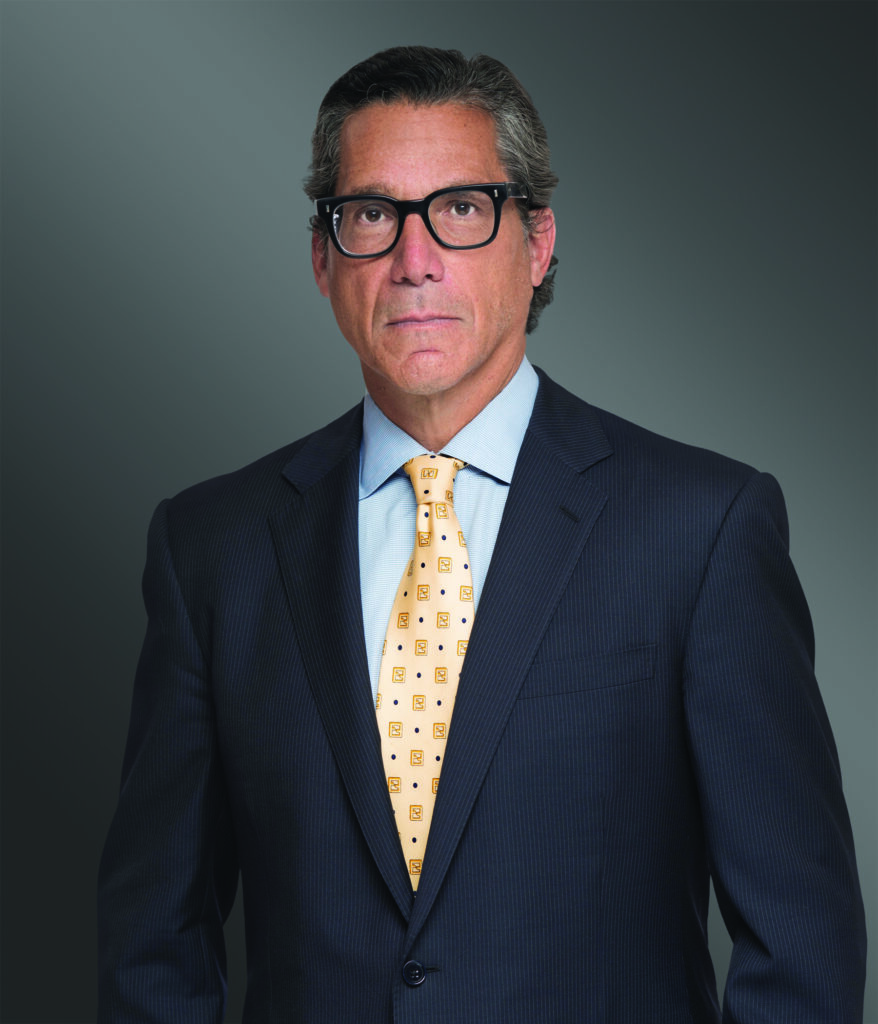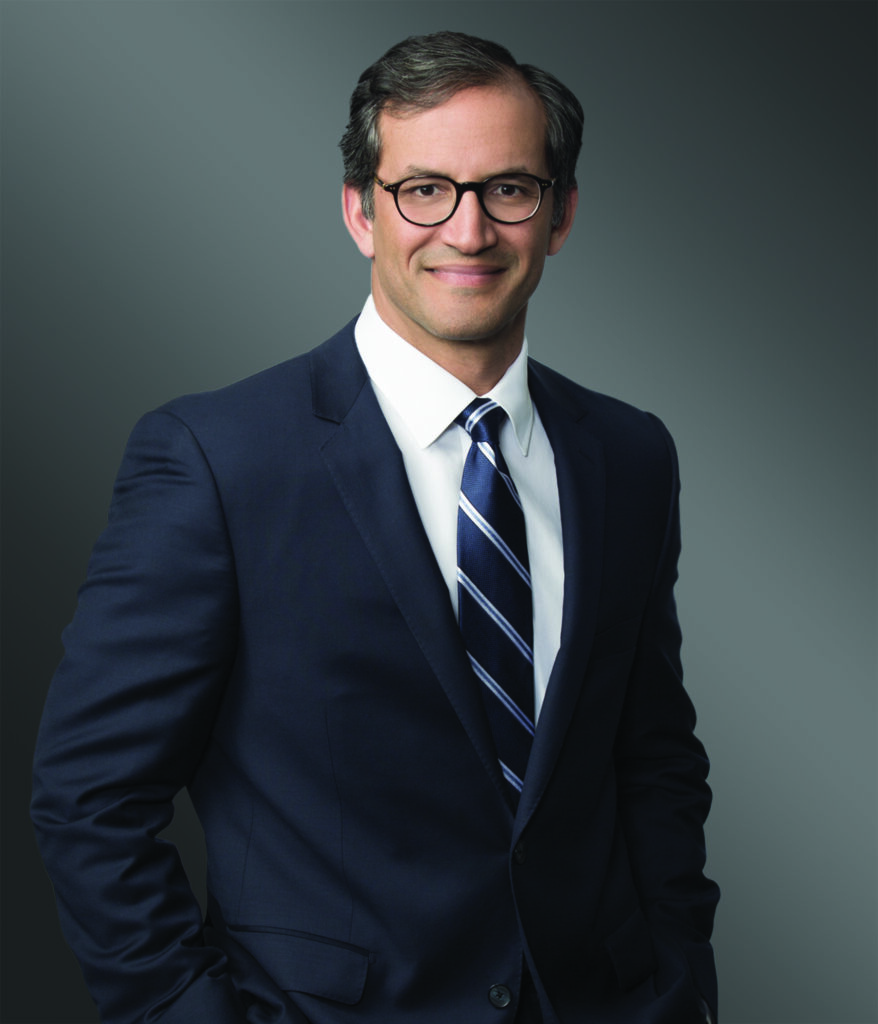
Publisher’s note: The following Q&A is a prelude to Greenberg Traurig and SMU Dedman School of Law’s “Serving Clients in the Spotlight” event on April 3. You can RSVP here.
Mathew Rosengart, recognized as one of the nation’s preeminent litigators, has been described as a “heavyweight attorney” by Law360, a “powerhouse lawyer” by ABC News, and “Hollywood’s King of Litigators” by Variety. His long-time client Sean Penn said that Mathew is a “tough as nails streetfighter with a big brain and bigger principles.”
Among other accolades, Mathew was recognized as Entertainment Litigator of the Year at the 2024 Benchmark Litigation US Awards, a Commercial Litigation and Sports & Entertainment Law Trailblazer by The National Law Journal; Litigator of the Week by The American Lawyer; and a Leader of Influence by the LA Business Journal, which described Mathew as a “go to litigator for Hollywood’s elite and Corporate America.“ A recipient of the Beverly Hills Bar Association’s Excellence in Advocacy Award, he has also perennially been acknowledged as one of the nation’s leading media & entertainment attorneys, both by The Hollywood Reporter in its “Power Lawyer Report” and by Variety which, for his body of work, also awarded him its “Power of Law” Award. He has also been described by The Legal 500 as a “heavy-hitting trial attorney,” by NPR as a lawyer with “a lot of star power” and by Los Angeles Magazine as a “winner” with “a long history of getting results for his big name clients.”

Among many other successes in high profile cases, Mathew obtained the landmark, court-ordered suspension of Britney Spears’s father as conservator of her estate; obtained the dismissal at trial on directed verdict of a case brought by the government against Sean Penn’s charitable organization (CORE); and prevailed for a professional athlete in a case involving Mathew’s innovative use of the California Talent Agency Act. He has also won a defamation lawsuit for Penn and a $6 million “cutting rights” case for Academy Award winner Kenneth Lonergan regarding his film Margaret starring Matt Damon. He was victorious in a multi-year $20 million NY-based arbitration for Credit Suisse against billionaire Ronald Lauder and 11 other claimants and obtained a $14 million trial verdict in a New York trial (on a counterclaim) after extensive bi-coastal litigation for his hedge fund against a prominent film production company. In addition, Mathew recently served as lead counsel for Fortune 20 company Verizon in one of the largest False Claims Act cases in the country, involving more than $500 million in claims.
Peter Wahby: You started your law career in government, tell us about your experience.
Mathew Rosengart: After law school, I served as a law clerk to then-New Hampshire Supreme Court Justice David Souter, who would later become a U.S. Supreme Court Justice. I am blessed that we remain dear friends to this day. This clerkship, which served as my introduction to public service, greatly inspired me and eventually led to my service as an Assistant U.S. Attorney and Trial Attorney, first in the Civil Division and then the Criminal Division of the Justice Department. As a federal prosecutor, I had the opportunity, and the honor, to represent the citizens of the United States, in an utterly fascinating, and fun, job.
Like all young federal prosecutors, I started working on garden variety federal crimes, with agencies like the FBI and DEA, ranging from bank robberies, to drug cases, and even a case in which the defendant tried to kill his wife with a pipe bomb. Later, I had the opportunity to work on some high-profile national and international public corruption cases. One of those cases afforded me the opportunity early on to cross examine United States Senators, former Secretary of State Warren Christopher, former Secretary of Defense and CIA Director Leon Panetta, and President Clinton’s White House Counsel, all of which was invaluable and definitely shaped my formative years.
Today, I reflect on these years and the lessons learned with both humility and great appreciation. The experience also really carried over to what I do now, by helping to teach me how to litigate, examine witnesses, and try cases.
As attorneys, we are in a position to help our clients and aggrandizing as it might sound, potentially even to positively impact society as a whole. I learned that lesson as a young lawyer at the Department of Justice, where the mission statement is literally to do the right thing, “to do justice.” These are high-minded principles that might sound trite, but are so very important. At the end of the day, we must use the knowledge and skills we have attained to make a difference, or at least to try to do so, in the right way.
Note: During Mathew’s career with the Justice Department, he was the recipient of the Justice Department’s Special Achievement Award and the Federal Younger Lawyer Award, bestowed by a panel of federal judges to the top five federal government litigators under age 36. His last supervisor at DOJ, now federal judge Robert J. Conrad called Mathew “one of the sharpest lawyers I’ve ever met at the Department of Justice,” who “helped secure a felony conviction and the largest campaign finance fine ever,” whose “judgment is impeccable.”
Wahby: Tell us about your transition from federal prosecutor to a Hollywood litigator representing top celebrities.
Rosengart: I don’t really consider myself a “Hollywood” litigator but rather a commercial litigator because that is how I was trained, and I’m fortunate to be able to work on a variety of cases for a variety of clients. That said—and I think most former federal prosecutors would agree—the training you receive in that job is unsurpassed, as is the litigation skillset you learn at the Justice Department, ranging from addressing judges and juries in court to how to cross-examine witnesses and prepare a case for trial.
Wahby: What are some of the unique aspects of representing entertainment industry icons like Steven Spielberg and Sean Penn? How are these types of clients and their legal matters different from other representations?
Rosengart: In addition to the corporate side, I’ve been very fortunate, and honored, to represent a number of high-profile entertainment professionals, including several Academy-Award-nominated writers, directors, and actors, as well as production companies. My approach to working with all clients, whether an individual in entertainment or a corporation—and whether in the public eye or not—is to work hard, establish a relationship of trust, and work closely with them for their best interests. And to work with passion. High-profile personalities or entities are often the target of vexatious claims or embellished stories, which is a third rail for me and many of my clients.
Conventional wisdom is that celebrities receive “special treatment,” but in fact they are often targets, which can be very unfair. A related thought that comes to mind is what my client, the legendary filmmaker Michael Mann told Variety, which is that he thinks I bring a level of creativity to my cases. This was an enormous compliment and very flattering, especially coming from Michael. It is definitely something I aspire to and it is expected by celebrity clients in particular, who are, by definition, creative. Creativity as a litigator can make or break a case, and of course, there is no substitute for extreme preparation and hard work, no matter the area of law. As I said, I also believe passion for your clients and cases can be a difference maker.
Note: Earlier this month, Mathew was named Entertainment Litigator of the Year at the 2024 Benchmark Litigation US Awards. The awards recognize the country’s most distinguished litigators and their firms for exemplary work over the past 12 months.
Wahby: How do you manage media interest in your clients’ matters?
Rosengart: Always be intentional with your actions. Each client is different and therefore approaches to their legal needs will vary. Take the time to listen and then formulate a strategic plan with their best interests in mind. If the media is interested in the matter—which they often are depending upon the client—be extra thoughtful with your words and analyze the situation at hand.
Wahby: What is different in your representation of high-profile companies versus representing an individual?
Rosengart: There are a lot of similarities between representing a company and an individual and we zealously represent all of them. However, matters can sometimes be more personal when working with individuals, thus potentially making the stakes even higher in some respects. With individuals, reputations can be directly on the line and their personal goals may fluctuate depending on the matter, unlike companies where policies are often spelled out by boards and executives and systems with which they are familiar, making goals and processes clearer.
But regardless of whether it’s an individual or a corporation, it’s crucial to keep in mind that what you do and how you do it will affect somebody’s life or career. That is something that Justice Souter, whom I revere, ingrained in me from a judicial perspective, and I hope it has carried over to private practice.
Greenberg Traurig shareholder Peter S. Wahby partners with his clients to develop and implement creative strategies across a broad range of disputes in venues across the country. While some disputes are best resolved with a quick, negotiated agreement, others may require a full adjudication on the merits, or further relief through the appellate courts. Whatever the need, Peter works to develop a value-based approach to ensure that his clients’ business goals are being aggressively pursued while their costs are predictable and controlled. With proven judgment, based on his first-chair trial experience and clerkship at the Supreme Court of Texas, Peter works with his clients to assess how to practically achieve their objectives while maintaining a responsive dialogue throughout the relationship.

